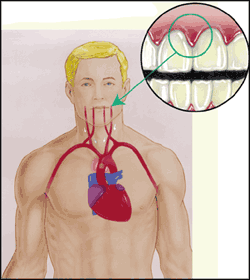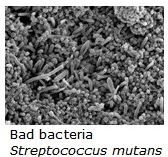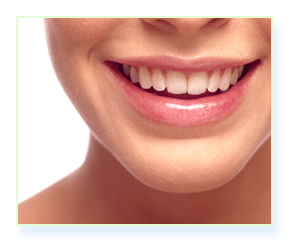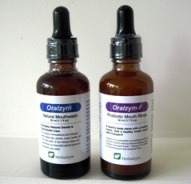Gum disease is not just a matter of oral discomfort, bad breath and loose teeth, but in fact it can also affect other parts of your body including some internal organs such as pancreas and heart. For example, a recent research study by Harvard Medical School found that men with periodontal disease had a 61% higher risk of pancreatic cancer than those with no gum problems. In Belgium, the University of Liege reported that 91% of patients with heart problems who participated in their trial had moderate to severe periodontal issues. Gum disease, according to the study, can be linked to an increased risk of heart attack and stroke, as plaque accumulation can result in swollen arteries. It’s not an overstatement, therefore, to say that in order to have a healthy body, first you need to have healthy gums!
Recent studies suggest gum disease may contribute to or be warning signs of potentially life threatening conditions such as:
 Heart Disease and Stroke - Studies suggest gingivitis may increase the risk of heart disease and stroke because of the high levels of bacteria found in infected areas of the mouth. As the level of periodontal disease increases, the risk of cardiovascular disease may increase with it. Other studies have suggested that the inflammation in the gums may create a chronic inflammation response in other parts of the body which has also been implicated in increasing the risk of heart disease and stroke.
Heart Disease and Stroke - Studies suggest gingivitis may increase the risk of heart disease and stroke because of the high levels of bacteria found in infected areas of the mouth. As the level of periodontal disease increases, the risk of cardiovascular disease may increase with it. Other studies have suggested that the inflammation in the gums may create a chronic inflammation response in other parts of the body which has also been implicated in increasing the risk of heart disease and stroke.Evidence now suggests that periodontal disease is an autoimmune disorder, in which immune factors in the body attack the person’s own cells and tissue — in this case, those in the gum. It appears to work as follows:
Studies suggest that this inflammatory response may have damaging effects not only in the gums but also in organs throughout the body, include the heart. Periodontal disease is now proving to be an autoimmune type disease, with bacterial toxins as the trigger. Periodontal disease, Arthritis, Cardiovascular Disease, Cerebral Vascular Disease, Diabetes, and a host of many more are all linked by the fact that they are immune disorders dressed up as “other issues” Periodontal.disease was almost totally controlled by 2 genes that controlled inflammation. It is almost 100% a genetic disease that can be made much worse by smoking. It demonstrates itself in the mouth and is nothing more then an Immune System Gone Awry. It needs a trigger to start but once started it only takes minimal forces to keep it going. If you have the two bad genes that adversely affect the way your body responds to irritation with an exaggerated inflammatory response and smoke you will loose teeth early.
People with periodontal disease have a defective immune response to the antigens that the perio pathogens produce. Thus periodontal disease is an immune disease that is caused initially by poor home care and bacterial antigens but is propagated by a systemic defect that some have and some don’t. It is a bacterially induced immune response.
In auto immune disorders, your immune system is out of order and is attacking your own tissues; hence auto immune disorders are very hard to treat. The most common treatments for auto immune disorders are symptom specific treatments. For example, it is very common that your doctor prescribe pain relievers for pain or anti inflammatory medications for periodontal disease patients. A real solution to auto immune disorders is to modulate (not suppress) the immune response to normal balance without any side effects. Immune modulation has the advantage that, contrary to immune suppression, very few side effects can be observed from regulating the immune system back to normal. It also offers the advantage over symptomatic drugs in that the symptoms reverse themselves on their own after the immune system has reached proper balance, and this is done treating the root of the problem, and not only the symptoms. A strong and modulated immune system is your best defense. A new breakthrough product OralZym-F ™ is an immune response modulator and powerful MMPs (matrix metalloproteinases) inhibitor.
How are we going to desensitize immune system against bacterial toxins and proteins being attacked?
First, we want to generally cut down on inflammation.
Second, we want to shift the immune response from a cell mediated Th1 dominant to a Th2 dominant response. If the cell mediated immune system (Th1) becomes “overactive” it can attack normal tissues.
Third, we want to induce tolerance to the bacterial toxins and enzymes that are being attacked by the Th1 lymphocytes. This is called immunological tolerance and it a process by which the immune response learns to ignore certain molecules. In short, it tolerates their presence and does not attack them.
Fourth, we want to activate adult stem cells to regenerate destroyed cells.
Your mouth is a jungle! Like everywhere else in your body, your mouth is loaded with billions of bacteria constantly on the move. While some bacteria are harmless, others can attack the teeth and gums. Harmful bacteria are contained in a colorless sticky film called plaque, the cause of gum disease. If not removed, plaque builds up on the teeth and ultimately irritates the gums and causes bleeding. Left unchecked, bone and connective tissue are destroyed, and teeth often become loose and may have to be removed. Gum disease is not just a matter of oral discomfort, bad breath and loose teeth, but in fact it can also affect other parts of your body including some internal organs such as pancreas and heart.
 If you’re dedicated to following a pretty good oral care routine and still have stained (or yellow) teeth and bad breath, you may have a bacterial imbalance in your mouth. Other signs that bad bacteria are gaining a strong foothold include poor tooth and gum health and bleeding gums. The harmful and beneficial bacteria in your mouth are directly at odds with one another. They compete for space on the teeth and food. If the bad bacteria are winning that war, one way you’ll know is in the smell of your breath. The harmful bacteria that reside in the mouth produces volatile sulfur compounds (VOCs) which are best known for their rotten-egg smell. Now, your breath doesn’t have to smell like rotten eggs to know that bad bacteria and VOCs are causing foul play. Bad breath is a sign that things are not right, and one simple way to rectify the situation is to address the bacterial imbalances in your mouth.
If you’re dedicated to following a pretty good oral care routine and still have stained (or yellow) teeth and bad breath, you may have a bacterial imbalance in your mouth. Other signs that bad bacteria are gaining a strong foothold include poor tooth and gum health and bleeding gums. The harmful and beneficial bacteria in your mouth are directly at odds with one another. They compete for space on the teeth and food. If the bad bacteria are winning that war, one way you’ll know is in the smell of your breath. The harmful bacteria that reside in the mouth produces volatile sulfur compounds (VOCs) which are best known for their rotten-egg smell. Now, your breath doesn’t have to smell like rotten eggs to know that bad bacteria and VOCs are causing foul play. Bad breath is a sign that things are not right, and one simple way to rectify the situation is to address the bacterial imbalances in your mouth.
 Probiotics are live microorganisms that when administered in adequate amounts confer a health benefit on the host. The human body is teeming with bacteria and other microorganisms. Some bacteria are good for you. Unfortunately, some cause harm, even infection and disease. The most commonly referred bacteria in the probiotic category are Lactobacillus acidophilus. However, there are many other beneficial strains. Research has shown that not only are probiotics beneficial for digestive and immune health, they can also affect your oral health.
Probiotics are live microorganisms that when administered in adequate amounts confer a health benefit on the host. The human body is teeming with bacteria and other microorganisms. Some bacteria are good for you. Unfortunately, some cause harm, even infection and disease. The most commonly referred bacteria in the probiotic category are Lactobacillus acidophilus. However, there are many other beneficial strains. Research has shown that not only are probiotics beneficial for digestive and immune health, they can also affect your oral health.
What are oral probiotics?
The human mouth is awash with bacteria. More than 700 species thrive in the hot, moist conditions, including Streptococcus mutans, one of the main components of plaque. Clinging to the teeth in thin layers called biofilms, S. mutans digests sugars and produces acids that can eat into enamel and cause cavities.
Oral probiotics protect against the bacteria that cause inflamed tissue, tooth and tissue decay and bad breath. Oral probiotics can protect your mouth, gums, teeth and throat from cavities, gum discomfort, sore throats, biofilm on your tongue, bad breath and even ear discomfort. Probiotics kill the bacteria, like h.pylori that cause ulcers and bad breath. This is done by making hydrogen peroxide.
In oral cavity, probiotics can create a biofilm, acting as a protective lining for oral tissues against oral diseases. Such a biofilm keeps bacterial pathogens off oral tissues by filling a space pathogens would invade in the absence of the biofilm and competing with cariogenic bacteria and periodontal pathogens growth.
 Probiotics can reduce the risk for a high Streptococcus mutans level occurrence. An in vitro study has suggested Lactobacillus rhamnosus GG can inhibit colonization by streptococcal cariogenic pathogens, and therefore reduce tooth decay incidence in children. A study reported a reduced tooth decay incidence in children taking probiotic L. rhamnosus GG-enriched milk versus a control group of children taking milk without probiotic enrichment. Another study showed that bovine milk fermented with Lactobacillus reuteri was effective against S. mutans, resulting in a reduced risk for tooth decay. Also, in a comparative study of S.mutans reduction effects by probiotic administration, showed a reduced S. mutans level in patients receiving probiotics. In another study probiotics effects were assessed after administration; a reduced S. mutans level versus control group was found. Effects of an ice-cream containing Bifidobacterium lactis on S. mutans and Lactobacillus level in saliva were assessed; a significantly reduced level was observed for S. mutans, but not for Lactobacillus. Effects of lactic strains used as probiotics in oral cavity were evaluated; Streptococcus thermophilus and Lactococcus lactis strains were shown to reduce cariogenic bacteria levels (particularly Streptococcus sobrinus and also Streptococcus oralis, Actinomyces naeslundii, and Veillonella dispar).
Probiotics can reduce the risk for a high Streptococcus mutans level occurrence. An in vitro study has suggested Lactobacillus rhamnosus GG can inhibit colonization by streptococcal cariogenic pathogens, and therefore reduce tooth decay incidence in children. A study reported a reduced tooth decay incidence in children taking probiotic L. rhamnosus GG-enriched milk versus a control group of children taking milk without probiotic enrichment. Another study showed that bovine milk fermented with Lactobacillus reuteri was effective against S. mutans, resulting in a reduced risk for tooth decay. Also, in a comparative study of S.mutans reduction effects by probiotic administration, showed a reduced S. mutans level in patients receiving probiotics. In another study probiotics effects were assessed after administration; a reduced S. mutans level versus control group was found. Effects of an ice-cream containing Bifidobacterium lactis on S. mutans and Lactobacillus level in saliva were assessed; a significantly reduced level was observed for S. mutans, but not for Lactobacillus. Effects of lactic strains used as probiotics in oral cavity were evaluated; Streptococcus thermophilus and Lactococcus lactis strains were shown to reduce cariogenic bacteria levels (particularly Streptococcus sobrinus and also Streptococcus oralis, Actinomyces naeslundii, and Veillonella dispar).
The effect of probiotics on gingivitis and different grades of periodontitis was studied; probiotics treatment resulted in better microbiota normalization than control group. Researchers showed a significantly reduced gingival index and bacterial plaque amount in patients treated with L. reuteri than in a placebo group and concluded that this probiotic was effective to reduce gingivitis and bacterial plaque deposition in patients with moderate-to-severe gingivitis. High levels of Lactobacillus in microbiota caused an 82% and 65% inhibition in Porphyromonas gingivalis and Prevotella intermedia growth, respectively. Researchers used L. reuteri-containing probiotics in 42 healthy patients and assessed its effects on crevicular fluid volume, cytokine (interleukin-1β, interleukin-6, interleukin-10, and TNF-α) levels, and bleeding on probing. Crevicular fluid volume, as well as TNF-α and interleukin-8 levels, and bleeding were significantly reduced.
A study showed that three types of bacteria were commonly associated with fresh breath. Six other types of bacteria were also found in people with bad breath. Regular use of probiotics can help to control bad breath. After taking Weissella cibaria, reduced levels of volatile sulfide components produced by Fusobacterium nucleatum were observed; the effect could be due to hydrogen peroxide production by W. cibaria, causing F. nucleatum inhibition. Streptococcus salivarius also suppress volatile sulfide effects, by competing for colonization areas with volatile sulfide-producing species.
How is Oralzym-F different from a digestive probiotic?
All probiotics are not the same. Oralzym-F is one of the best clinically shown probiotics specifically created for oral health. Oralzym-F contains a unique blend of 5 strains of beneficial oral probiotics including Lactobacillus reuteri, S. salivarius (BLIS K12 and BLIS M18 ), Streptococcus thermophilus, Bacillus coagulans and Lactococcus lactis designed to restore the balance and strengthen the defense mechanisms of the mouth. Oralzym-F is the latest in major advancements for the care of your oral health.
 Oralzym-F is made for rebalancing of oral bacterial flora. It represents a whole new level of oral care, one in which good oral health is supported and maintained with good microflora –just the way nature intended. Oralzym-F is the first microflora rinse specifically designed for complete oral care. This all-in-one product supports gum and tooth health and naturally freshen breath while gently whitening teeth.
Oralzym-F is made for rebalancing of oral bacterial flora. It represents a whole new level of oral care, one in which good oral health is supported and maintained with good microflora –just the way nature intended. Oralzym-F is the first microflora rinse specifically designed for complete oral care. This all-in-one product supports gum and tooth health and naturally freshen breath while gently whitening teeth.
Oralzym-F activates and attachs themselves to the teeth and gum tissue, establishing colonies of live, active beneficial microflora both on the surface of the teeth and deep beneath the gum line. These colonies compete for both nutrients and space with the harmful oral bacteria that disrupt gum and tooth health, as well as cause bad breath. With daily replenishment, the powerful 17 strains of beneficial probiotics used in Oralzym-F helps to reestablish the natural microbial balance in the mouth for healthy gums and teeth, fresher breath and whiter teeth.
 Oralzym-F can be used just like mouth rinse.
Oralzym-F can be used just like mouth rinse.Put 1-3 drops of Oralzym-F into your mouth using the dropper and then rinse mouth with water for at least 30 seconds and spit. You may also gargle with the diluted Oralzym-F for a healthier tongue, throat, and to stop and cure bad breath. It’s Fast-Acting. You can actually Feel Sensational Results within a Few Seconds. Don’t drink any water after you do this step. This should be the last step before you go to bed. For best results, use Oralzym-F after brushing teeth with Oralzym. Do not eat or drink for 5 minutes.
Many dental care products are antibacterial or antiseptic. This shotgun approach kills oral bacteria indiscriminately and disrupts the bacterial balance in the mouth. While this approach may provide short-term superficial results, it can ultimately increase the imbalance of opportunistic bacteria. For example, antibacterial mouthwashes that claim to wipe out 99.9% of bacteria fail to mention that the bacteria repopulate in about an hour, often leaving the upper hand to the harmful bacteria.
Within one to two hours after using antibacterial mouthwash or breath freshener, the surviving 1% of the bacteria remaining in the mouth can repopulate the full level of harmful bacteria that was present in the mouth before the product was used. This indiscriminate destruction of bacteria creates ongoing imbalances in the microflora that naturally inhabits the oral cavity. The powerful microflora in the mouth are natural antagonists to the odor creating bacteria, quickly colonizing to create a healthy balance of microflora and resulting in longer lasting, truly fresher breath.
On the other hand, the blend of beneficial oral microflora created in Oralzym-F crowd out the harmful bacteria by colonizing in the same places bad bacteria like to hide and by competing for the same nutrients.
Within 4-5 days of using Oralzym-F three times daily, the natural healthy oral balance of good microflora will be greatly restored and you will begin to notice healthier gums, brighter smile and long-lasting fresh breath.
Oralzy-F contains: 100% natural plant based enzymes, Peppermint, Specialized 17 different strains of oral probiotics.
 Warning: Stop “Listerine-ning” your Mouth….Top Mouthwash Brands linked to Oral Cancer!
Warning: Stop “Listerine-ning” your Mouth….Top Mouthwash Brands linked to Oral Cancer!You no longer have to put harmful chemicals, toothpastes and irritants into your mouth (most of which can make your gums even worse). Oralzym-F does not contain fluoride, chemicals, artificial colors, preservatives, additives, artificial flavors, alcohols, and animal by-products.
Keep out of reach of children. Avoid direct contact with eyes. Store in a cool, dry place.